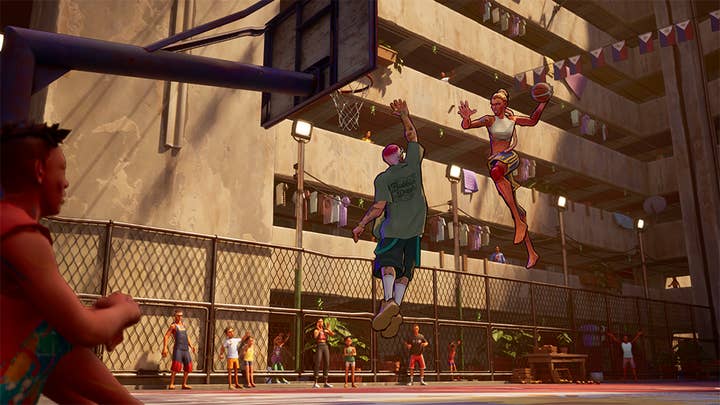EA vets' new studio Play By Play aims to revive the spirit of NBA Street
We speak to CEO Scott Probst and creative director Mike Young about what the sports games market is missing while serious simulations dominate
Most sports video games can be daunting for those with just a casual interest in the activities they emulate. While the likes of FIFA, Madden, NBA 2K and MLB The Show aren't entirely inaccessible to the mainstream, they are also clearly geared towards those who live and breathe football (traditional or American), basketball, baseball or whichever ball-based sport is at the title's core.
There are a handful of alternatives through the likes of Nintendo's Mario-fronted sports games, but by and large these simulation titles are the only option for those who wish to indulge in a little digital athleticism.
A team of Electronic Arts veterans are determined to change this with the formation of Play By Play Studios, a new developer that emerges after three years of stealth today.
The company is led by CEO Scott Probst, perhaps best known as the former general manager of the EA-owned Visceral Games, which made Dead Space 2 and 3, as well as various Battlefield and Star Wars games. Meanwhile, creative director Mike Young has spent the last ten years in the same role on the Madden franchise, prior to which he worked on all four NBA Street games.
It's the latter that is a major inspiration for Play By Play's debut game, The Run: Got Next – a three-vs-three character-driven basketball game, heading to PlayStation 5, Xbox Series X|S and PC in 2025. While it won't be free-to-play, the team has emphasised it won't be a $70 premium price either.
This game, Probst tells GamesIndustry.biz, typifies the new studio's goal of "bringing sports games back in a different way to what's being done in the industry today."

"We can have a lot of fun and offer a different type of basketball. We don't necessarily have to adhere to the rules of the professional organisation"
Scott Probst, Play by Play Studios
While Probst never worked on the EA Sports side, unlike 23-year veteran Young, he recalls fond memories of NBA Street, SSX and similar titles and argues that there are few comparable games on the market today. He holds up 2003's NBA Street Vol. 2 as "the holy grail of gameplay for us," and says Play By Play aims to bring that pick-up-and-play mentality of such titles and marry them with the more modern mechanics of hits such as Rocket League.
Specifically he refers to the likes of online multiplayer and the focus on short burst sessions, something Young adds has been a "super big thing" for the team.
"We love the idea of having games that are less than five minutes," the creative director tells us. "When you play a game, maybe you get blown out but it doesn't feel that bad. You're not slogging through a game for 40 minutes to an hour.
"We want you in and out having meaningful sessions, making progress. We looked at games more like Fortnite and Rocket League where you jump in with friends, and maybe you get to the top ten, maybe you get to the final two, maybe you win. But even if you lose, even if you're out in the first ten people, you feel like you didn't waste a ton of time and you're right back into another meaningful game. You didn't chew up your whole night on one match."
Another hallmark from the sports games of the past the studio hopes to recapture is the controls, which Young argues "felt way more responsive back in the day because they weren't trying to simulate momentum," nor did the animations have to be photorealistic.
Again, he points to NBA Street, where if you were lined up for a dunk but see a strong defence, you can pass to another player quicker than you could with current titles' more rigid animation.
"We want you to feel in control of the game at all times," Young says. "And because of the way tech has evolved, we can make those blends look way better than they did back in 2007 when the last NBA Street launched."
On a similar note, Young says the team is working hard on making defence feel as good as offence. He observes that in titles like MLB The Show, there are modes where you can skip entire parts of a match to get back to the offence part of a game, or have things handled automatically as with Madden's play calling. But this, he argues, takes away from the experience.
"You're not empowered, you don't feel special," he says. "But in our game, we feel like we're getting back to that, where blocks are just as powerful as shots and there's a counter for everything. Maybe the best blocker in the NBA gets three or four blocks in a game [but] that could happen on one possession in our game. It creates a lot of tension, a lot of back and forth."
Another downside to the focus on realism in current sports games, Young continues, is that all the athletes feel the same with only minor differences in ability. Play By Play is aiming for a more character-driven experience – not only akin to the hero shooters that have been on the rise for the past decade or so, but also harking back to retro sports games. Probst and Young both cite 1987 arcade sports game Tecmo Bowl or 1988 Nintendo title Ice Hockey, where characters had different sizes, speeds and traits. Similarly, The Run: Got Next's stars will "all have towering strengths and glaring weaknesses," says Young.

The titles the Play By Play team draw inspiration from are all decades old. If the studio believes these ideas are appealing to modern audiences, why aren't modern sports games already delivering them? Probst says that it's because Play By Play's approach "hasn't been proven in this genre yet" and argues it's down to larger companies avoiding risk.
"When you look at sports, a good way to de-risk it is to go put this badge on it, put this licence on it, and so on," he says. "If I were to say today, I want to make a fighting game and I'm not going to include any mixed martial arts fighters or any boxers. People would say I'm nuts – but then we wouldn't have Street Fighter or Mortal Kombat. I think those games were some of the riskiest games to probably go build at the time, because you're creating these characters that aren't real-world fighters, but it turns out that's a 30-year franchise that people still love to play to this day. Me included."
Young adds that, while he and his fellow former NBA Street devs have been asked countless times why the series isn't returning, these types of titles need to be built from the ground-up, rather than with the technology that has been heavily invested in for the major simulation games.
Play By Play is better positioned to take the risk and build such a game from the ground up because it's a small team. The core studio is around a dozen people, which expands to between 20 and 30 when you factor in contractors and development partners. Probst tells us the team has been kept intentionally small because "we've done great things with teams of this size in the past."

"We know basketball is loved by billions across the world and we want to have a non-intimidating social game that is just fun"
Mike Young, Play By Play Studios
By comparison, the simulation sports games are made by hundreds of people. In this regard, Play By Play seems to be setting itself for a 'david and goliath' style confrontation with their former employers and rivals. But Probst emphasises the goal is not to go head-to-head with the likes of EA and 2K, but instead to "offer a different flavour."
"We absolutely recognize that 2K, in our particular case, is the 800-pound gorilla," he says. "But we're not going to be focused on things like building out an open-world city and sending players on quests and doing things in the game that really don't focus on the sport of basketball.
"The fact that we are street-based means we can get in and we can have a lot of fun and offer a different type of basketball. We don't necessarily have to adhere to the rules of the professional organisation. We can have a lot more fun from a gameplay mechanic standpoint."
Young offers the example of The Run: Got Next's Himilayan court, where strong winds will make it harder to achieve three-point shots and characters will run out of stamina faster, unless that's their home court. This, he says, is the type of experience current sports games aren't offering, as they're more focused on the wish fulfilment of running a team or being a player for your favourite team.
Finally, multiplayer is another key focus when it comes to the different flavour that Play By Play hopes to provide. Again, Probst and Young hark back to Tecmo Bowl, NHL 94, RBI Baseball and other titles where the only option for multiplayer was couch co-op. By contrast, Young argues that current sports games aren't really designed to be played together, but to pit players against strangers.
"My son's a huge gamer, but he'll play games like Madden and NBA 2K, but it will be solo. He and his friends will be talking to each other [on the phone] about what they're doing in their own unique franchises and stuff like that. But then when they want to play, they have to go to a game like Fortnite.
"We're trying to connect players socially. The reason why they go to games like Fortnite is you don't have to be that good at those games. You can just join in with your buddies and the person who's really good at it can help you, whereas a lot of the SIM sports games are pretty intimidating.
"We know basketball is loved by billions across the world and we want to have a non-intimidating social game that is just fun."

